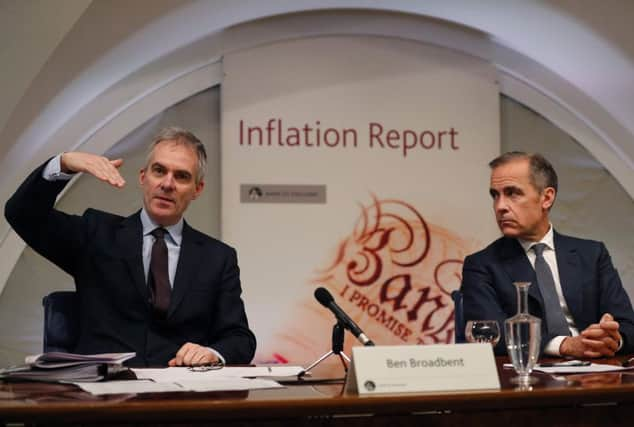Bank warns households face Brexit squeeze as inflation rises


Mr Carney warned of “a more challenging time” for the British population over this year as a result of the falling value of the pound since last year’s Brexit vote.
His predication came as the Bank kept interest rates on hold at 0.25 per cent and nudged down its growth forecast to 1.9 per cent for 2017 from two per cent in February.
Advertisement
Hide AdAdvertisement
Hide AdMr Carney warned that a “slowdown appeared to be in train” after a sharper-than-expected fall in consumer spending.
Growth slowed sharply to 0.3 per cent in the first three months of the year from 0.7 per cent in the previous three months.
The Bank said, while it expects first-quarter expansion to be revised higher to 0.4 per cent, the economy would likely continue at a “similarly moderate pace of growth in the second quarter and beyond”. The pound slumped following the governor’s announcement, falling 0.4 per cent against the US dollar to below 1.28.
Against the euro, the pound was trading 0.3 per cent down at €1.18.
The Bank said this year would be the worst for the pressure on household finances, with wage growth set to pick up over the next three years, while the wider economy will also strengthen.
Mr Carney said: “Wages are still growing and we expect the pace of growth will accelerate as this year progresses and continue into 2018 and 2019.”
“Real income growth will return.”
The bank’s report, released alongside the interest rates decision, offered better news for the growth outlook as forecasts were raised to 1.7 per cent for 2018 and 1.8 per cent in 2019 from February’s prediction for 1.6 per cent and 1.7 per cent respectively.
The Bank said growth would be supported by a recent recovery in business investment and higher exports amid a bounce-back in the global economy.
Advertisement
Hide AdAdvertisement
Hide AdWhile inflation, currently at 2.3 per cent, would likely peak at close to three per cent in late 2017, the Bank forecast the pound would pick up after the general election. A rise in the pound’s value would help inflation ease back in 2018 and 2019.
But Mr Carney warned that improving fortunes were based on a “smooth” adjustment when it came to EU withdrawal that would see a transition period to avoid a cliff edge departure.
Mr Carney said forecasts also assumed a “significant” pick-up in wage growth, due in part to business concerns over the Brexit process starting to ease.
But he warned that if wage growth fails to rise, “there will be consequences”.
Minutes of the interest rates meeting showed seven of the bank’s Monetary Policy Committee (MPC) members voted to keep rates unchanged.
Outgoing policy-maker Kristin Forbes remained the sole dissenter, repeating her call for a rise to 0.5 per cent on worries over rising inflation.
The minutes suggested the next move in rates would still be a rise, with other MPC members repeating it would take “little further upside news” to consider joining Ms Forbes in voting for a hike.
The Bank added that financial market assumptions for just one rate rise to 0.5 per cent in 2020 would not be enough to rein in inflation.
Advertisement
Hide AdAdvertisement
Hide AdBut economist Howard Archer at IHS Global Insight said rates were still set to remain on hold until at least 2019.
He said: “We maintain the view that the Bank is being too upbeat on the growth outlook with some pretty optimistic assumptions, particularly relating to the likely pick-up in wage growth.
“We also think Brexit uncertainties will hamper growth.”
